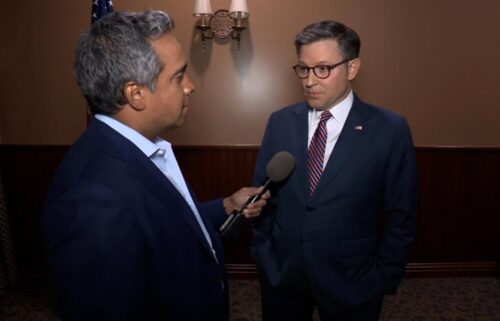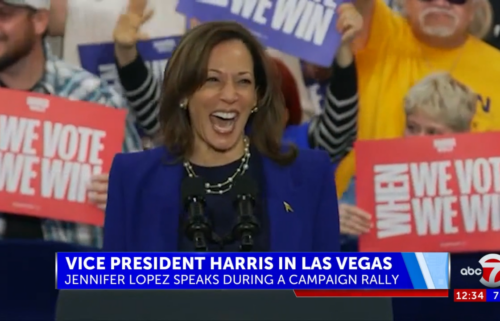Special counsel Jack Smith’s office is bracing for retribution if Trump wins
By Katelyn Polantz, CNN
(CNN) — One year after bringing historic indictments against former President Donald Trump, the prosecutors left in special counsel Jack Smith’s office are gaming out legal options and bracing for retribution if Trump returns to the White House.
Trump has called Smith a “sick puppy” and pledged to fire him “within two seconds” – which would effectively end two criminal cases over the former president’s handling of classified documents and efforts to overturn the 2020 election. The Justice Department is also unable to prosecute a sitting president.
But until Inauguration Day in January, Smith would have time to weigh his options on issues the department has never had to confront before.
One early hurdle is whether the Justice Department’s Office of Legal Counsel considers a president-elect to be covered by the same legal protection against prosecution as a sitting president. That guidance would determine the next course of action, people briefed on the matter told CNN.
More than a half dozen people who are close to the special counsel’s office or other top Justice Department officials told CNN that they believe Smith doesn’t want to close shop before being ordered to do so or being pushed out by Trump.
“He’s not going to be the one to say, ‘I’m going to fold the tent,’” a former Justice Department official with insight into Smith’s approach told CNN.
The prosecutors are also prepared for a personal toll, including the possibility of GOP-led congressional investigations into their work and internal professional reviews that could be initiated by the Justice Department at Trump’s urging.
Many also have girded for right-wing-initiated furor toward them, knowing it was a possible outcome even two years ago when they joined Smith’s team. The special counsel’s office has had harassment briefings, especially related to online doxing, cybersecurity and stalking. Smith has his own detail of several security guards, and others on his team have taken steps to protect their safety.
Meanwhile, the office is already down to a skeleton crew as some prosecutors have left for other jobs within the Justice Department. Others are also considering leaving, including going to large corporate defense firms where Justice Department lawyers often wait out the revolving door of Democratic or Republican administrations.
The pay in those private-sector jobs is often more lucrative and can defray personal legal bills, if they end up needing to hire their own lawyers.
In the event that Trump wins, staffers detailed to the special counsel’s office would have the option to go back to their home divisions within the Justice Department. Unlike political appointees like Smith, they aren’t able to be fired at the direction of the president.
But former prosecutors on the Trump case could face a difficult workplace, once Trump’s appointees are running the department.
Keeping Trump cases alive
While closing his office before Inauguration has always been an option, sources believe Smith and his core team are likely to keep both Trump cases alive in court as long as they can, knowing they could run headlong into Trump’s wrath.
Smith and his team are appealing Judge Aileen Cannon’s July decision to dismiss the classified documents case against Trump and his two co-defendants in which she ruled Smith didn’t have the authority to charge the case. The department is appealing her dismissal in a broader defense of its ability to use special counsels to insulate politically sensitive investigations. The issue is likely to go to the Supreme Court if the appeals continue.
Cannon’s dismissal of the case wasn’t particularly demoralizing to Smith’s office, sources say, in part because some of the prosecutors realized early on that Cannon would likely be a bad draw for them when she first got the case in 2023.
Still, the prosecution team around the case in Florida was dwindling even before Cannon shut the case down. One prosecutor whom many had believed would have tried the case, David Raskin, left Smith’s office before Cannon dismissed the case to oversee Hamas-related and other national security prosecutions under his own longtime close colleague, now-assistant attorney general for national security Matt Olsen.
In Washington, Smith’s prosecutors are pressing forward in the criminal case alleging Trump orchestrated a conspiracy to overturn the 2020 election after the Supreme Court ruled Trump had immunity for certain official acts taken as president.
In recent weeks, the special counsel’s office filed its 252-page brief in an attempt to convince the trial judge and, potentially, the Supreme Court, Trump’s actions aren’t immune from prosecution.
That move — a sweeping public presentation of evidence with sharp language about Trump’s intent and culpability — was an example of Smith’s undeterred approach, some of the sources said. Trump’s lawyers have criticized the approach in court as out of step with typical case procedure and unfair to Trump as a defendant.
The immunity brief may be the most comprehensive documentation of the January 6 federal criminal case the public will ever see.
Justice officials watching election
Inside the Justice Department, top leaders are watching the election closely, knowing they will need to confront unprecedented legal questions should Trump win.
If Vice President Kamala Harris wins, the choices for the department and the special counsel’s office may be much simpler. The two criminal cases would continue on. Individual prosecutors would have to decide whether to stay on the case long enough to take Trump to trial, which could take years.
Attorney General Merrick Garland has long maintained the two federal criminal cases against Trump, once charged, were in the hands of the court system.
“The matter is now in the hands of the trial judge to determine when a trial will take place,” he told CNN in January.
In the event that Trump wins, one question will be what to do in court during the presidential transition. The Justice Department has long maintained it wouldn’t prosecute a sitting president while he is in office.
Smith and Justice officials almost certainly will need to seek the advice of the department’s Office of Legal Counsel on whether a president-elect can be prosecuted, which could prompt the DOJ to also set the policy for future presidencies, the people briefed on the matter said.
In the January 6 case, prosecutors also could ask the federal trial judge, Tanya Chutkan, to hold the case in abeyance — essentially put it on ice — in the months before Trump takes office.
Then, on January 20 when Trump would be inaugurated, the procedure could get complicated. The January 6 case against Trump is in the hands of Chutkan and approved by a grand jury – two functions of democracy that sit outside of the executive branch and the Justice Department’s total control. Prosecutors would need to ask Chutkan to dismiss the case.
And while the judge ultimately is likely to do so, Chutkan may not immediately close it, and could ask for additional filings, arguments and information.
“Just think of the chaos of it all – that, he [Trump] would love,” one of the former Justice Department officials said.
CNN’s Evan Perez contributed to this report.
The-CNN-Wire
™ & © 2024 Cable News Network, Inc., a Warner Bros. Discovery Company. All rights reserved.




